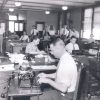calsfoundation@cals.org
Gene Foreman (1934–)
Born in a small Ohio town and reared in the rural community of Wabash in Phillips County, Gene Foreman became one of Arkansas’s and the nation’s most honored newspaper editors. At the Arkansas Gazette, he was a leader in the paper’s coverage of the tumult over school integration in Little Rock (Pulaski County) in 1957–1959. Foreman also became managing editor at the Pine Bluff Commercial and the Arkansas Democrat. He spent most of his career as an editor at the Philadelphia Inquirer. He managed the newsroom at the Inquirer for more than twenty-five years, a period during which the newspaper received numerous awards for its reporting, including eighteen Pulitzer Prizes. In retirement, he was a professor of journalism at Pennsylvania State University (Penn State) and published a widely used textbook on journalism ethics.
Gene Clemons Foreman was born on November 20, 1934, in Fremont, Ohio, the second of six children of Clemons Walter Foreman and Louise Vogel Foreman. Gene Foreman’s father was a postal worker and National Guard commander in nearby Oak Harbor when he met Louise Vogel of Wabash, who was visiting relatives in Ohio. They were married in 1931 at Wabash and returned to Oak Harbor. Foreman’s father spent his life savings at a sheriff’s sale to buy 1,000 acres near Wabash that had been cleared of timber by a Chicago lumber company and turned it into a plantation, a widespread occurrence in the Delta counties in the 1920s and 1930s. The family moved to Wabash in July 1941 so that Foreman’s father could take charge of running the plantation, which included the challenging task of dealing with Depression-era bankers to arrange financing of each year’s crops.
Encouraged by an uncle who was an editor at the Toledo Blade in Ohio, Foreman had a consuming interest in journalism as a child, reading the Memphis newspapers, writing community news for the weekly Phillips County Herald, and proofreading for the daily Helena World in the summers and Saturdays while he was in high school. He graduated from Elaine High School in Elaine (Phillips County) and enrolled at Arkansas State College (now Arkansas State University) in Jonesboro (Craighead County), where he was class president and an editor of the college newspaper.
He worked as a summer intern after his freshman year at the Memphis Press Scimitar and after his sophomore year at the Gazette, where, he would later recall, he would have “one of the great experiences of my life in journalism.” When regular reporters were busy, city editor William T. Shelton sent the student intern a block down the street to the Marion Hotel, where a former state highway official was to hold a news conference. It was Orval E. Faubus announcing at the last minute that he was running in the Democratic primaries against Governor Francis Cherry, who was seeking the traditional second term. The powerful utility and investment-banking baron W. R. “Witt” Stephens had warned Faubus that if he ran against Cherry, then Stephens would find and bankroll an opponent for Faubus’s friend Congressman James W. Trimble of Berryville (Carroll County). Both Stephens and Faubus had been instrumental in the administration of Governor Sid McMath (1949–1953). Faubus waited until the filing deadline approached to announce and file for governor—too late for Stephens to get an opponent for Trimble. Foreman was then assigned to help cover the ensuing governor’s race. In the Democratic runoff, Faubus defeated Cherry.
Foreman graduated from Arkansas State in 1956 and went to the Gazette as a reporter, immediately reporting on Faubus’s reelection campaign against state senator Jim Johnson of Crossett (Ashley County), a virulent segregationist who authored the interposition amendment to the constitution that Arkansas voters ratified that November to preserve white supremacy. During the two-year struggle after Faubus sought to prevent the integration of Little Rock schools, first by the use of National Guardsmen in 1957 and then by a school-closing law in 1958, city editor Shelton made Foreman, an exacting writer and grammarian, his assistant editor, supervising coverage and editing reporters’ articles.
Almost fifty years later, in an oral history for the David and Barbara Pryor Center at the University of Arkansas (UA) in Fayetteville (Washington County), Foreman described his directing of the coverage of events that effectively ended the great school integration crisis, for both Arkansas and the onlooking nation. In August 1959, as the beginning of the school year approached, the U.S. Supreme Court struck down Arkansas’s 1958 school-closing law, which Faubus had used the previous year to close Little Rock high schools to avoid integrating the schools. The Arkansas Supreme Court, in a split decision, had upheld the school-closing law. The Little Rock School Board met quickly the same day as the decision and voted to start the school term in two days, to leave no time for Faubus and the Arkansas General Assembly to find a way around the court’s decision and continue to keep the schools all-white.
Since Shelton was on vacation, the twenty-four-year-old assistant city editor was in charge. He assigned thirteen of the newspaper’s fourteen reporters and all its photographers to prepare for the great rush of events of the first days of school as African Americans entered classes in Little Rock and North Little Rock (Pulaski County). A mob formed at the Arkansas State Capitol the first morning of school and moved toward Central High, carrying flags and signs that read “Stop Race Mixing,” “Race Mixing Is Communism,” and “Follow Faubus For Freedom.” A new police chief ordered the fire chief, who was a segregationist, to have firemen join the police lines to protect the school. High-pressure firehoses helped the police disperse the mob as it approached Central High at 14th and Park streets. A roofing contractor and Ku Klux Klan leader retaliated by hiring thugs to dynamite the fire chief’s car and school board offices. The dynamiters, including the contractor, E. A. Lauderdale, were arrested and imprisoned. (Faubus subsequently pardoned Lauderdale.) The school year went peacefully thereafter, and the political climate and rhetoric changed, owing either to resignation or disgust at the lawlessness and violence of the virulent segregationists.
Foreman received an army commission as a Reserve Officers’ Training Corps (ROTC) cadet at Arkansas State and served six months on active duty in late 1956 and early 1957. After finishing first in his class of seventy-four lieutenants in the field officer basic course at Fort Sill, Oklahoma, he worked with howitzer crews on the firing range. He then spent eleven years in the reserves, ending his service as a major.
In 1960, Foreman was promoted to state editor of the Gazette, responsible for covering news from counties besides Pulaski County. Over the next two years, he began shifting coverage from routine items by part-time correspondents to enterprise stories produced by Gazette staff writers roaming the state.
In 1962, he joined the New York Times as a copyeditor, but five months later, the typographical employees went on strike, which lasted for four months. Unable to support his family on the union’s strike pay, he returned to Arkansas. At the time, after six years in the news business, he had come to the conclusion that his professional strength was in newsroom management. Thus, in 1963, he became managing editor of the Pine Bluff Commercial and began leading twenty newsroom staffers. In 1968, he joined the Arkansas Democrat, a struggling afternoon paper at that time, with about sixty newsroom employees. He left after three years to become executive news editor at Newsday on Long Island.
When Gene Roberts, a former New York Times reporter and editor, became executive editor of the moribund Philadelphia Inquirer in October 1972, he hired Foreman as the managing editor, in charge of daily newsroom operations. The Inquirer’s rise as one of the world’s great newspapers began, and at its peak it had about 500 journalists on staff. In addition to directing the paper’s news coverage, Foreman chaired a newsroom committee that developed a code of ethics for journalists that spread across the profession. (In 2010, he would publish a book, The Ethical Journalist: Making Responsible Decisions in the Digital Age, based in part upon the ethical dilemmas he faced as a reporter and editor over forty years; subsequent editions came out in 2015 and 2022.)
Foreman retired from journalism in 1998 and joined the College of Communications at Penn State, becoming the inaugural Larry and Ellen Foster Professor of Journalism. He taught there full-time until his retirement in 2006. After retiring, he continued to direct the Foster Conference of Distinguished Writers, which brought top professionals, including dozens of Pulitzer Prize winners, to Penn State to share their experiences. The series was renamed the Foster-Foreman Conference of Distinguished Writers at the request of Larry and Ellen Foster.
Foreman was president of the Associated Press Managing Editors in 1990 and a board member of the American Society of Newspaper Editors from 1995 to 1998.
He married a colleague at the Gazette, JoAnn Baldwin, in December 1957 in Little Rock, and they had five children in the 1960s. In suburban Philadelphia, for more than a decade beginning in 1977, they were foster parents to a total of eleven children, who stayed from a few days to a few years; they adopted two of the children. After Foreman’s retirement from Penn State, the couple moved to Charlottesville, Virginia, near the family of their daughter Susan, a professor at the University of Virginia. His wife died in 2017.
For additional information:
Foreman, Gene. The Ethical Journalist: Making Responsible Decisions in the Digital Age. Hoboken, NJ: Wiley-Blackwell, 2010.
Jordan, Gerald. “Interview with Gene Foreman.” August 4, 2000. Arkansas Gazette Project, David and Barbara Pryor Center for Oral and Visual History. https://pryorcenter.uark.edu/project.php?thisProject=2 (accessed May 24, 2023).
McConnell, Jerry. “Interview with Gene Foreman.” July 18, 2006. Arkansas Democrat Project, David and Barbara Pryor Center for Oral and Visual History. https://pryorcenter.uark.edu/project.php?thisProject=1 (accessed May 24, 2023).
Risley, Ford. “Oral History Interview with Gene Foreman.” Pennsylvania Newspaper Journalists Oral History Program, 2007. https://www.bellisario.psu.edu/assets/uploads/Foreman_Interview_revised.pdf (accessed May 24, 2023).
Ernest Dumas
Little Rock, Arkansas
 Divergent Prosperity and the Arc of Reform, 1968–2022
Divergent Prosperity and the Arc of Reform, 1968–2022 Mass Media
Mass Media The Ethical Journalist
The Ethical Journalist 



Comments
No comments on this entry yet.